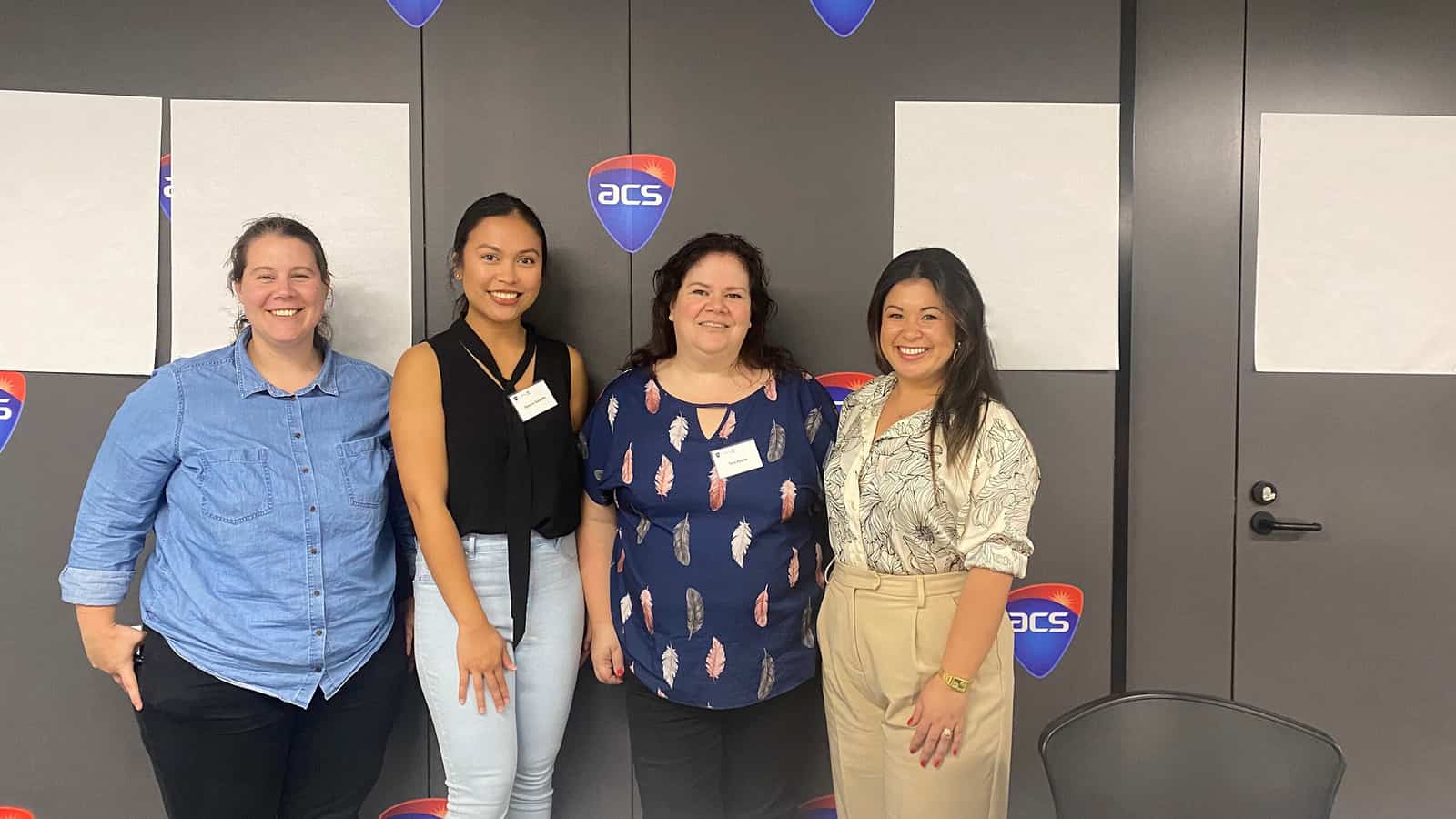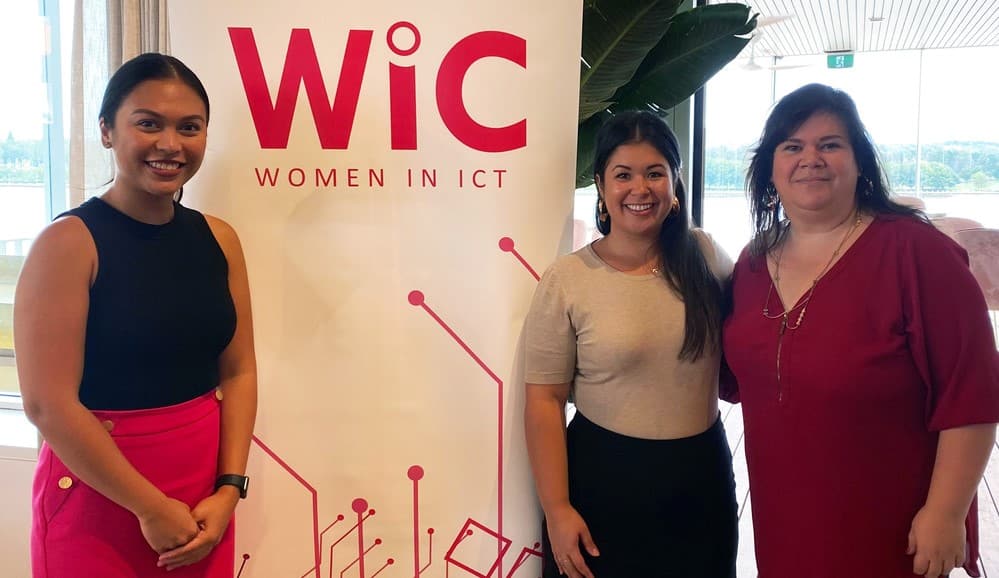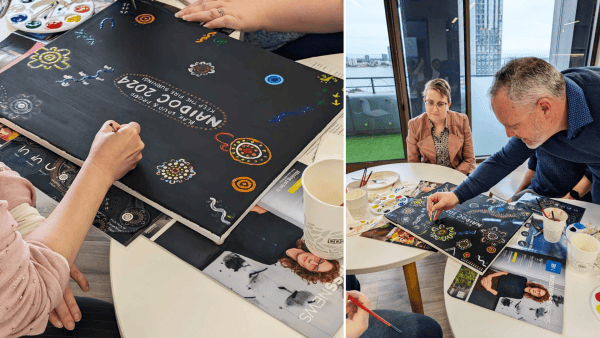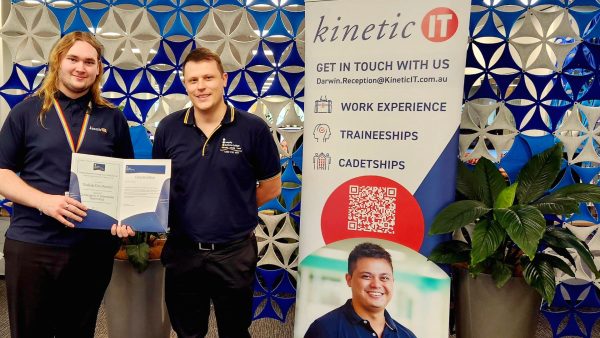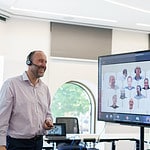In February 2023, Kinetic IT crew attended a community consultation in the Australian Capital Territory (ACT) to discuss gender equity focusing on leadership and workforce participation.
As a joint initiative facilitated by Women in ICT (WIC) and the Australian Computer Society (ACS), the workshop-style event centred around providing feedback to the ACT Government on the Third Action Plan of the ACT Women’s Plan 2016-26.
Community members of WIC, ACS and the local IT workforce attended the consultation. The group consisted almost exclusively of women who were part of the IT industry in varying roles, representing a myriad of backgrounds. Designed to gather information and perspectives from local people in IT roles, Kinetic IT’s delegates were able to contribute to a proposal submitted to the ACT Government on the ACT Women’s Plan.
Our delegates – Narita Neron, Jamie Swaker, and Bianca Gabalfin – attended as regional representatives for Kinetic IT’s new partnership with WIC. Kinetic IT and WIC were delighted to announce and celebrate their partnership during the event, and shine a light on our mission to actively participate in making our work environment a better place for women.
We talked to our delegates to gain insight into the top matters they learned and shared at the community consultation on the ACT Women’s Plan, and why it’s important to hold these conversations around gender equity in the workforce and IT.
RELATED CONTENT: Women in Information and Communication newest community partner for Kinetic IT
1. Diversity of voices is crucial for effective community conversation
“The women in attendance came from IT-related fields and were in varying stages of their careers and from numerous cultural backgrounds,” said Jamie Swaker, Operations Manager of Reporting & Intelligence. “It was awesome to see the vast array of women who were participating in making our region and workforces better places for gender equity.”
Narita Neron, SIAM Business Analyst, agreed. “As this was a consultation aimed for women’s input on the ACT Women’s Plan, it was energising to see a mix of women from all walks of life participating in the conversation to provide their feedback and share their unique experiences.”
“I learned that the ACT has some serious powerhouses of women out there, and I only met a small handful of them! Although the cohort was quite small, our opinions were united and loud. There were many ‘aha, I didn’t think of that perspective before’ moments amongst the group. One of the benefits of having such diversity in the attendees was that there was representation and acknowledgement of intersectionality.”
RELATED CONTENT: Want a career in cyber security? Experts share 7 useful tips
2. It’s essential for individuals and communities to help drive government policies
“Community consultations are such an important part of public policymaking,” said Narita. “I’m a firm believer that it’s our civic responsibility to participate in community matters, not only to represent ourselves and our interests, but also to advocate for those who may not have the same privilege of attending.”
Jamie agreed: “It’s crucial for communities to help our governments drive policies that make a difference. It’s up to our communities to advocate and help our governments to really be a voice for all people.”
Bianca Gabalfin, Sourcing & Mobilisation Advisor, said it was meaningful for her to attend the event as a woman in IT. “While I work in the recruitment team, I do come from an IT background. One of the barriers I faced when I was starting my career was the heavily male-dominated nature of the industry. I remember it being quite intimidating.”
“Now that I’m in the IT recruitment industry, I’m in a position where I can help change the narrative. I want to be that friendly face and offer access to information that’s not readily available. I want to encourage people of different backgrounds, such as return-to-work mums or carers with amazing untapped skills, and let them know that IT is not as scary as they might believe.”
Bianca said the challenge was showing potential candidates the opportunities and openings across the IT industry. “As a recruitment advisor, I can advocate for them, showcase their skillsets to the hiring managers, and help them get back into the workforce by negotiating and offering some form of flexibility while they ease into it.”
RELATED CONTENT: Sure to Rise podcast / Episode 2: Capability versus availability with Lucy Harding and Hannah Davey
3. We can improve how we hire and promote women in IT roles
As a recruitment advisor, Bianca said the event gave her great insight into other companies’ hiring practices and how the industry can improve and further encourage women to take on IT roles. She said the big questions to ask related to flexibility, salaries and gender pay gaps.
Jamie also found value in gaining insight into other organisation’s practices “Having such a diverse group of people meant there were varying opinions and perspectives that I had not considered. Listening to the ways that other businesses, universities, and community groups were attempting to get women into the workplace was incredibly interesting and there were some excellent points we all took on board to help boost women’s participation.”
4. Some fantastic feedback came out of the ACT Women’s Plan community consultation
Our delegates shared some of the topics of the feedback given during the conversation on the ACT Women’s Plan including pay equity and the flexibility of working environments. They also discussed equitable sharing of non-paid work such as housework or raising children and needing more career pathway information for girls within the education system.
“Some excellent ideas the government can action are creating women’s only job boards and events where women re-entering the workforce can start fostering relationships with businesses,” said Jamie. “They can also change the education curriculum to include more information about career pathways for girls. Encouraging young girls to get into STEM-related areas helps create a more diverse range of people in these historically male-dominated industries.”
Bianca shared some actions she’d like to see come from the consultations on the ACT Women’s Plan. “I hope to see events scheduled during school hours and return to work programs so it’s not as daunting after being out of the workforce for a while. I’d also like to see mentorship and leadership opportunities especially involving women who have been there and done that. Women in the ACT and the rest of the world need to know these things are available. It all comes down to education and information – we don’t know what we don’t know.”
RELATED CONTENT: The 10 most popular IT careers at the Go Girl tech conference
5. Women should apply for roles, even if they’re not sure they meet every criterion
Jamie shared an interesting statistic about women and recruitment: Women only apply for jobs when they meet 100% of the criteria in the job description, while men will apply when they meet only 60% of the criteria. “This problem starts at the front door and can affect future abilities to promote women into positions of leadership,” said Jamie. “It’s up to us as people and an organisation to help overcome that barrier.”
“As individuals, we can encourage women we know to apply for roles even if they’re not sure they meet everything. As a business, we could adjust our job descriptions to show flexibility on required skills or skills that could be trained on the job. We can also be open to hiring someone who might not have all the right skills but does have a phenomenal attitude and willingness to learn. The change starts with us as people and as a business, and whatever way we can help our communities to better themselves will absolutely benefit us in the long run.”
6. Pushing for gender equity is a requirement
“Gender equity isn’t something that should be seen in any one region or place,” said Jamie. “It’s a global requirement to push for gender equity. It’s everyone’s responsibility to include a diverse range of people in all aspects of government, business, and our communities, so we are truly able to use different perspectives to make our world a better place. Having women in the workforce and in leadership positions brings traits that are sometimes not seen in male-dominated workforces. These qualities can help drive up participation and employee engagement due to more collaborative management styles, while visibility provides inspiration for other women.”
Narita agreed. “It’s necessary to further gender equity because gender shouldn’t define your opportunities or potential. It’s vital to have women in the workforce and in leadership positions for representation and diversification in workplaces. It’s equally important to recognise that while some women may want to pursue careers, other women may perceive work in different capacities.”
Bianca said our differences are what makes us great. “If we all think the same, talk the same, and move the same, there’s no growth, there’s no challenge and no balance. That’s why it’s necessary to have a diverse group of people working together because we all have something we can bring to the table, that no one else can. We need to be inclusive of diverse ways of thinking and employ more women in leadership roles because, frankly, there are not enough.”
RELATED CONTENT: Sure to Rise / Episode 1: Celebrating First Nations women and addressing the gender pay gap with Kathryn Logan
7. It’s worthwhile to get involved
Kinetic IT’s delegates found the community consultation “inspiring”, “energising” and a worthwhile contribution to the ACT Women’s Plan.
“No matter who you are, get engaged in programs like WIC or community policy forums and help better our communities,” said Jamie. “We all have an individual perspective, and it doesn’t matter whether a suggestion is big or small, our contribution can make our part of the world a little better.”
Narita encouraged more people to attend similar events. “I’d highly recommend anyone to attend these events in future. It was energising to connect with like-minded women in the ACT’s IT industry.”
Bianca was grateful to have participated in the event. “It was really inspiring to work with people and strangers who are all giving up their Friday evenings to help spark change.”
Kinetic IT is committed to building enduring and authentic relationships through our partnerships, including with the community. Find out how we partner on our website.



